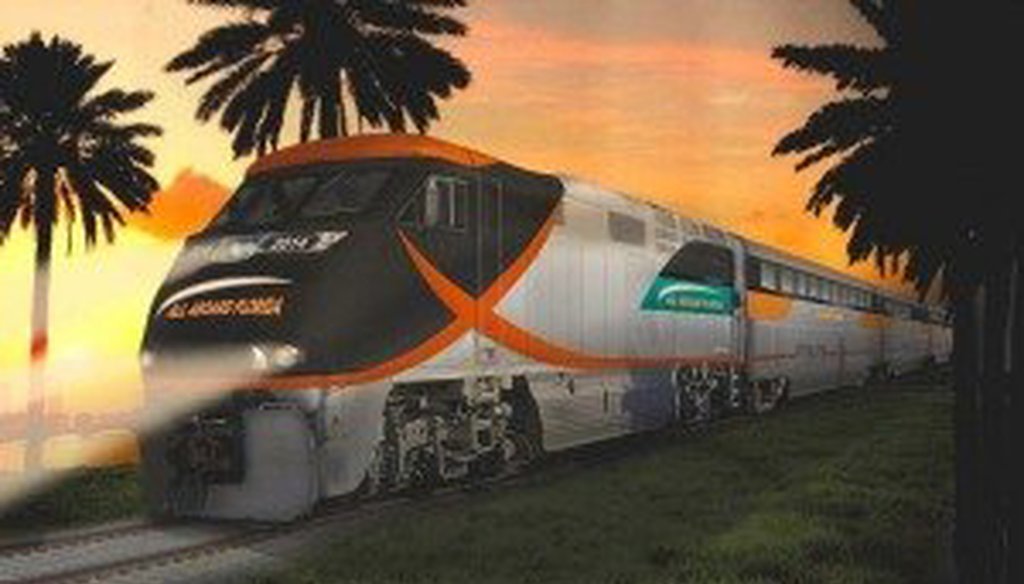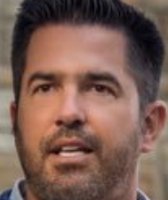Get PolitiFact in your inbox.

A rendering of a train for All Aboard Florida.
A plan to build a passenger rail service connecting Miami and Orlando has fueled attacks in this year’s race for governor.
The project has faced opposition from some residents on the Treasure Coast, who fear noise and other impacts. And as he campaigns for re-election, Scott has faced heat for the role of his chief of staff, Adam Hollingsworth, who previously worked for All Aboard’s parent company.
Amid media reports this summer about state money connected to the project, Scott and Crist made conflicting statements about the project’s financing.
"All Aboard Florida is a 100 percent private venture. There is no state money involved," Scott said in a TV interview on June 30.
Crist made the opposite charge in a July 10 fundraising email: "All Aboard Florida is receiving millions in Florida taxpayer dollars."
PolitiFact Florida’s research showed us that this is a hard project to talk about sound-bites. It is a private venture, but there is government investment in the infrastructure. Both statements fail to tell the full story about funding related to the project.
Rail finances explained
All Aboard Florida is a $2.5 billion passenger rail line that will connect Miami, Fort Lauderdale and West Palm Beach in 2016, with hopes to extend to Orlando in 2017. Proposed by Florida East Coast Industries, LLC, All Aboard will use private financing for a large portion of its costs and has applied for a $1.6 billion federal loan.
Scott has supported the All Aboard Florida project, even though he killed a high-speed rail between Tampa and Orlando slated to get $2.4 billion in federal funds in 2011. The state’s portion of high-speed rail was going to be $280 million. Scott’s team has argued that the finances were vastly different, and that the risks to taxpayers on All Aboard Florida are much less.
Still, there is some state money that’s connected to the All Aboard project. We examined three pots of money:
Quiet zones: In 2014, the Legislature agreed to provide $10 million for "quiet zones" related to horns at railroad crossings for any rail. Local government agencies can apply for the money to benefit communities -- so All Aboard Florida can’t get the money.
Tri-Rail: Tri-Rail is an existing government-run passenger rail service in South Florida overseen by the South Florida Regional Transportation Authority. All Aboard mentioned in bond documents the possibility of using $44 million in state money to connect their trains to Tri-Rail, according to the Naples Daily News. However that never materialized, and the Florida Department of Transportation officially shot down the idea amid all the publicity.
The Orlando International Airport: This is the most concrete connection between All Aboard and state funding. The airport is building a complex to include the airport’s people mover, parking and ground transportation. Connected to that project, the airport is also building an intermodal transportation facility -- and that’s the piece that will get about $214 million from a loan and grant from the state.
The intermodal facility will accommodate rail -- including All Aboard Florida -- and potentially two other future rail projects, Phil Brown, airport director, told PolitiFact Florida.
All Aboard Florida will pay the airport $2.8 million a year for a lease, which the airport will use to repay a portion of the state loan. In addition, All Aboard will pay the airport between $1 and $1.50 per passenger. All Aboard Florida estimates that combined the total will add up to about $4.5 million a year.
Crist and Scott have both failed to communicate the full story about the financing. When Crist said that All Aboard "is receiving millions in Florida taxpayer dollars," it sounds like the state is cutting a check to the project, which it’s not. All Aboard will benefit from money spent on the Orlando airport, but All Aboard will pay for that benefit. We rated Crist’s statement Half True.
Scott made two key omissions when he described All Aboard as a "100 percent private venture" and claimed there is no state money "involved." The project could get a $1.6 billion federal loan, and there is state money involved at the airport. We rated Scott’s statement Mostly False.
Our Sources
Sun-Sentinel editorial board, Interview with former Gov. Charlie Crist, Aug. 5, 2014
See related fact-checks for additional sources
































